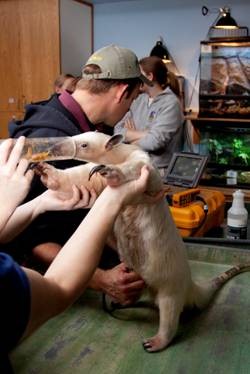We have been watching the happenings at the Denver Zoo for quite some time as they are a user of the E.I. Medical Imaging Ibex® Pro Durable Portable Ultrasound System. They use their system for many of the zoo animals and we get a chance to see it in action with a video provided by the Denver Zoo. The ultrasound of a pregnant tamandua is the first we have seen of this species.
We do all we can to suppoprt these types of programs and we always love hearing stories of these about animals being scanned all over the world. This one is right in our backyard. We wanted to share this amazing story with you and if you want to get more information, the Denver Zoo provided it's own version of the story with this press release:
DENVER ZOO TAMANDUA RECEIVES TOP PRENATAL CARE
Denver, CO (January 7, 2014) - Denver Zoo southern tamandua Rio is pregnant and receiving top prenatal care by animal and veterinary staff. The normally energetic anteater is taking it easy behind the scenes in the zoo's Gates Animal Housing center as zookeepers tend to her health. After Rio's latest ultrasound, veterinarians now believe she will give birth around March.
This will be the first birth for Rio and her mate, Quito. Neither is ever on exhibit, but rather they are very popular animals in the zoo's Education collection, which provides opportunities for up-close, animal encounters for programs like outreach visits and VIP tours. To minimize activity for the duration of her pregnancy, though, Rio will not travel away from the zoo.
Rio was born in November 2004 at Sedgwick County Zoo in Wichita, Kansas. Quito was born in August 2012 at Reid Park Zoo in Tucson, Arizona. The two were paired under recommendation of the Association of Zoos and Aquariums (AZA) Species Survival Plan (SSP) which ensures healthy populations and genetic diversity among zoo animals. Fortunately, the couple has proved to be an excellent match.
Tamanduas are born following a 130-150 day gestation period. As her expected birth date approaches, zookeepers will provide Rio with a nest box that will let her feel safe, yet still allow zookeepers to monitor her status. Veterinarians regularly perform ultrasound examinations to measure the head and body size of the new baby as well as checking both the mother and baby's body condition.
Zookeepers have also begun to slowly increase Rio's diet based on her needs. For instance, once a day Rio is usually fed 210 grams of high fiber, leaf-eater biscuits and 30 grams of mealworms, while 20 grams worth of earthworms are hidden around her enclosure for enrichment purposes to provide mental and physical stimulation. In the last week, zookeepers upped her biscuit intake by 20 grams.
Southern tamanduas are a species of anteater, often called lesser anteaters. They inhabit South America, east of the Andes, from Venezuela to Argentina and Uruguay. Their habitat ranges from savanna and thorn scrub to rainforests and they are well adapted to life both in trees and on the ground. In the wild they use tongues that can reach 16 inches to feed on insects such as termites and ants.
Although they are widespread, they are uncommon. They are hunted for the strong tendons in their tails, from which rope is made. Hunters often kill tamanduas, claiming they are killing their dogs, but they are really hunted for their meat. They can also be hit by cars. Tamanduas are vulnerable due to loss of habitat and human pest control, which has reduced the populations of termites and ants.
About Denver Zoo:
Denver Zoo is home to 4,000 animals representing more than 600 species and is accredited by the Association of Zoos and Aquariums (AZA). AZA accreditation assures the highest standards of animal care.
A leader in environmental action, Denver Zoo is dedicated to ensuring the safety of the environment in support of all species and is the first U.S. zoo to receive ISO 14001 certification for the entire facility and operations. This international certification ensures the zoo is attaining the highest environmental standards.
Since 1996, Denver Zoo has participated in 594 conservation projects in 62 countries on all seven continents. In 2012 alone, Denver Zoo participated in 98 projects in 18 countries and more than $1 million in funds was spent by the zoo in support of animal conservation in the field.
Photo courtesy of Denver Zoo














